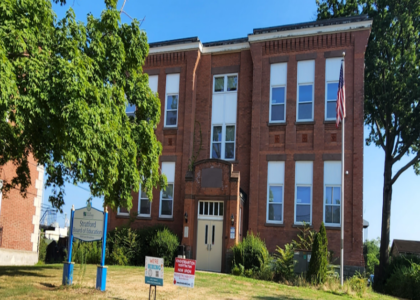“The Mayor’s press release celebrates that Stratford “stands out” as a community that holds the line on taxes. How is this accomplished?
As the Mayor suggested, look at our neighboring towns. None of them are using the taxpayer’s credit card to pay for the town’s annual operating appropriations. Stratford has increased its debt and borrowed $10 million simply to fund its day-to-day budget. Borrowing is not revenue. Borrowing is debt, and $10m is an increased tax liability of $500 for each one of our 20,000 households. $10m borrowed equates to an actual 2 mil tax increase – an actual tax increased tax burden. This budget may be violating Town Charter 6.2.3, but the town attorneys have not yet written their decision. NO other neighboring town has attempted to use borrowed money to pay for their current-year operating expenses.
Further, no other neighboring town is using COVID grant money to fund its re-occurring operating expenses. Read the budget, the town is NOT increasing its commitment to residents’ health and safety. A one-time gift of $4.7m, worth a full 1 mil, intended to supplement the town’s response to disease, is being re-directed to pay for everyday expenses. This is a potential violation of state and federal restrictions, but we’ve not yet received a statement from either the State’s Office of Policy Management (OPM) or the town attorneys.
Stratford has funded its pension obligations. In 2019 the town erased a $5m pension fund liability, but why did our taxes remain flat? Why did taxes not decrease by a full 1 mil? Despite the Mayor’s public statements, page 23 of the town’s budget verifies that Debt Service continues to increase every year – not a $3m reduction, but an actual increase of $1m. Not due to pensions, Not due to increased capital investment, but simply – due to using the taxpayers’ credit card to pay for day-to-day expenses. According to CT’s Center for Economic Research, even after paying off the 2019 pension bond, Stratford’s per capita debt is 2x greater than any neighboring town. This is NOT the way to “move forward”.
No other neighboring town has used the taxpayers’ credit card to fund their operational budget. No other town is taking one-time COVID grants to fund their operating expenses. Why is it necessary for Stratford to resort to such methods, simply to keep itself operating?
Stratford’s commercial/industrial grand list has grown 1/3 as fast as the town’s increased expenses and at only 1/2 the rate of inflation. This is not COVID, this has been the pattern over the past twelve years. Why is our commercial sector so weak? To learn why, on January 12th, nearly 10 weeks ago, we asked for documentation. The information was compiled in October 2020, 6 months ago. Without an evaluation of who contributes, we cannot verify the reliability of our grand list, and we cannot project the future of tax collections. information was compiled 6 months ago – why does the town refuse to share it with the town council?
The town’s mandated 2019 Comprehensive Annual Financial Report (CAFR) has been delayed by four months. For 120 days, town council has been denied access. Does the report document issues with our valuation of the grand list? Does the report include issues with the town’s use of Debt Service to fund its annual operating expenses? Without this information, how can we vote on a town budget?
Jay Wahlberg passed in April 2020, and the town charter 5.6.7 requires “an audit and investigation of accounts”. Its been one year, and the results of this mandated audit have not been released to the town council. What issues did this audit uncover? Without this information, how can we vote on a town budget?
In 2020, the tax liability of town’s low and moderate-income households increased by an average of 20%. Now families are receiving their increased tax bills from their mortgage lenders. Landlords are increasing rents. This is on top of the 30% increase in property taxes that occurred over the past 12 years. The Housing Partnership just documented that nearly 1/2 of the town’s homeowners are “housing insecure”, meaning they cannot afford to maintain a home in Stratford. Instead of transparency, the town is denying taxpayers access to information. Instead of accountable growth in our commercial/industrial sector, the town is shifting even greater tax liability to these vulnerable residents.
How does this proposed budget prepare our town for the future? This budget reduces our investment in the future. This budget cuts our Open Space Fund. It cuts our Redevelopment Fund. This budget does not fund our mandated Plan for Conservation & Development (POCD). This budget does not fund solutions to resolve our documented housing disparities. We fail to execute development opportunities, two examples Contract Plating and Center School are both 3 years behind schedule, yet this budget does not include critical project coordination. Without a dedicated Grant Writer, Stratford does not compete in acquiring third-party funding. Without a strategic marketing plan to increase our visibility to the investor and development industries, Stratford continues to be “off the radar”. For the political expediency of claiming “no tax increase”, this budget proposes we avoid evidence-based solutions.
Since the Mayor chose to compare us to other towns, let’s look at Milford. Milford has high cash reserves, and 1/2 the debt of Stratford. Unlike Stratford, Milford does not borrow money to pay its bills. Milford is not using one-time COVID grants to balance its budget. Milford grows organically, not by mortgaging its future. Milford opened over 500 new businesses last year. Using the Mayor’s own data, Milford’s economic development was nearly 4x more successful than Stratford’s. Milford has a lower mil rate than Stratford, and Milford has not had a tax increase in six years. Milford truly meets the definition of “moving forward”.
There is no reason to vote on this budget proposal tonight. There are dozens of reasons to wait until the regular April town council meeting. Legal and regulatory questions must be answered, the audit results must be released. Until the town council has been provided fundamental and necessary information that attests to the validity of its contents, this budget must be tabled.”
Greg Cann
Stratford District 5, Councilman (D)








